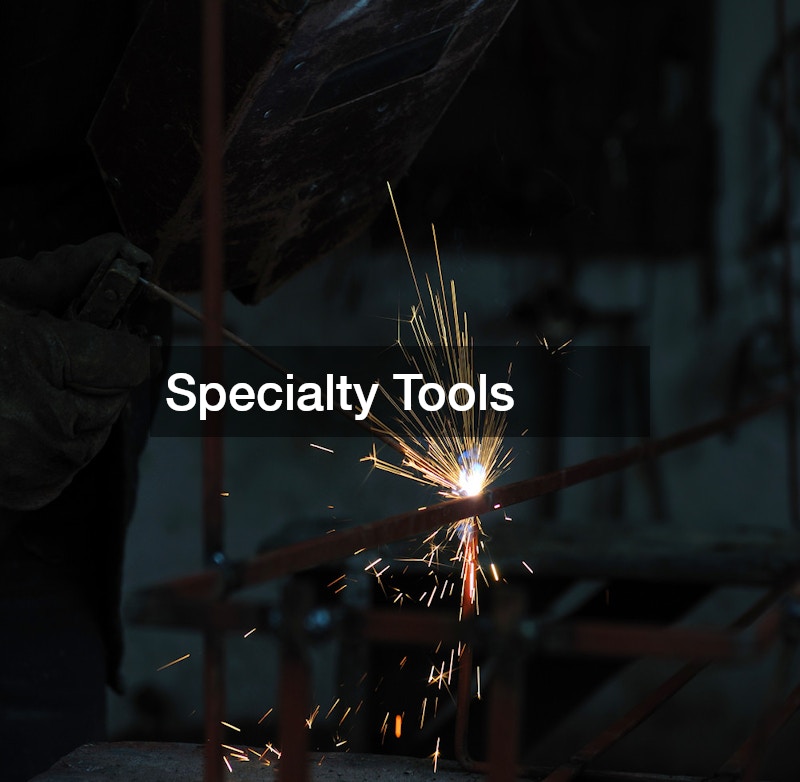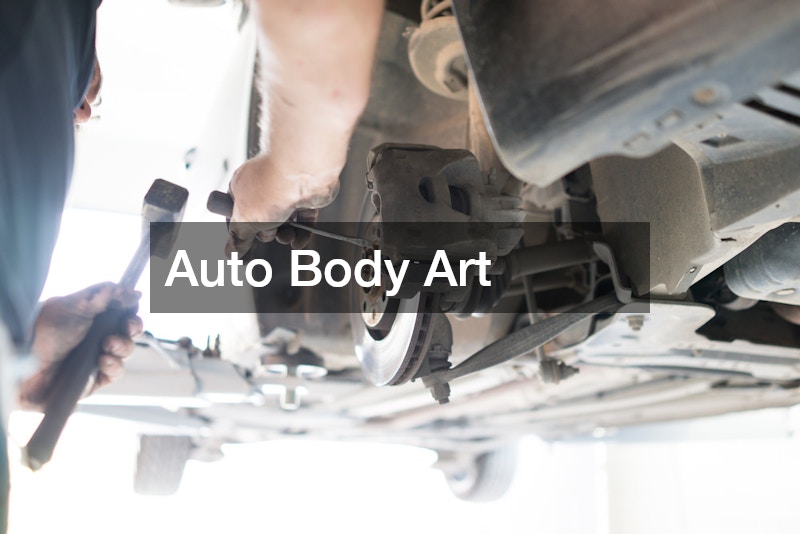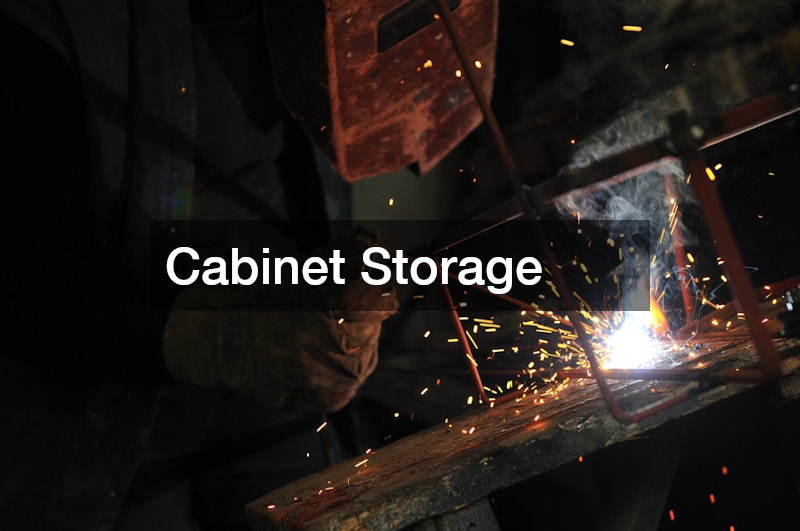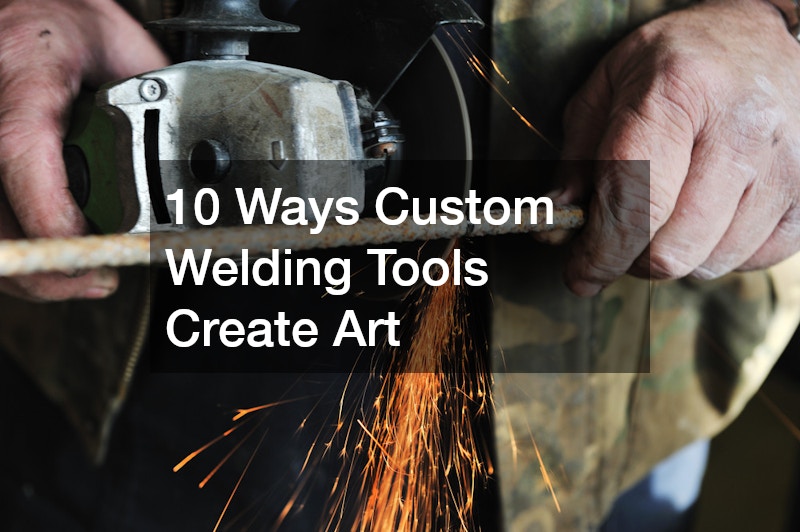Welding is an essential skill that has found its way into nearly every industry, from heavy construction to automotive repair, art, and manufacturing. Over the years, the role of welding has expanded beyond traditional uses, with welders now developing and utilizing custom tools to meet the unique demands of their trade. These specialty tools have allowed welders to tackle increasingly complex projects, whether it’s precision welding for intricate metal art or heavy-duty repairs for industrial equipment. The right welding tool not only improves efficiency but also enhances the quality of the work being done.
This article delves into various industries where custom welding tools have become invaluable. From auto body shops to heavy equipment repairs, and even sculpting art, each section explores how specialized welding tools enable professionals to perform tasks with greater accuracy, speed, and durability. We will also touch on the importance of welder training, as the effective use of these tools requires a high level of skill and understanding. Additionally, we’ll examine the role of metal scraps in custom tool creation, as well as the significance of the tools in various sectors, like storefront art or cabinet storage manufacturing.
Through this exploration, you’ll gain an understanding of how custom welding tools have revolutionized the craft and how they contribute to a diverse range of industries, enhancing both the functionality and aesthetics of the projects they serve.
Specialty Tools

Welding tools are often subjected to wear and tear, especially when used for industrial-scale repairs. Whether repairing large machinery or intricate equipment, specialized tools are critical for maintaining efficiency and achieving quality results. Welders frequently utilize tools and use tool repairs that are designed for specific repair tasks. For example, they may need to use custom jigs or fixtures to hold parts in place during repairs, ensuring that everything is welded accurately and securely. These tools can be tailored to suit a variety of repair tasks, whether for small components or large machinery, helping to prevent costly mistakes and reducing the risk of errors that can compromise the integrity of the repair.
Custom welding tools designed for repair applications also enhance precision. For instance, a welder working on a delicate component might need a tool that can apply a fine, controlled heat to ensure the repair is as seamless as possible. Without the appropriate tool, the repair might be subpar, leading to further damage. Repair tools can also be designed to handle specific materials, such as metals with varying thicknesses, which requires tools that allow for precise control over temperature and welding speed.
Custom welding tools are often designed and fabricated to meet the unique demands of specific projects. These tools are tailored to enhance the quality and efficiency of the welding process, addressing challenges such as difficult material types, tight spaces, or high-precision requirements. Many welders invest in creating their own custom tools to solve specific problems that off-the-shelf solutions can’t address.
For example, a custom clamp could be used to hold two metal parts in place during the welding process, allowing the welder to focus on achieving a strong bond without worrying about the parts shifting. Custom nozzles or tips can be designed for welding equipment to deliver more precise heat or a specialized gas mixture, improving the quality of the weld. These tools are not only more efficient but also save time by reducing the need for adjustments during the welding process.
Welder Training
Welding, like many skilled trades, requires in-depth training to master. While the fundamental principles of welding can be learned relatively quickly, it takes years of practice and experience to become proficient at the craft. Effective welder training programs provide both theoretical knowledge and hands-on practice, teaching students the basics of welding safety, material science, and the various welding techniques (e.g., MIG, TIG, and Stick welding). However, to become truly proficient, a welder must learn how to handle specialty tools and adapt their techniques to different types of jobs.
Training in the use of custom welding tools is a key part of this process. Welders must learn how to create, modify, and apply their tools to meet specific project needs. For instance, training may involve learning how to design a custom welding clamp for a complex repair job or how to use specialized welding nozzles to achieve a smooth, even weld. As the demand for precision and creativity grows in the welding industry, proper training in these areas becomes increasingly important.
In advanced welding training programs, students are often introduced to the concept of custom tool creation. Learning how to make your own tools is a valuable skill for experienced welders who want to take their craft to the next level. This may involve designing tools for specific repairs, creating jigs for holding parts in place, or modifying existing tools for better functionality. The ability to think creatively and craft custom tools not only improves the welder’s personal skill set but also adds significant value to their work.
Metal Scraps
One of the key industries benefiting from custom welding tools is the metal roofing sector. Metal roofing involves a lot of welding to ensure that the panels are securely fastened and that the roofing structure is stable and long-lasting. Custom welding tools are often employed to handle the unique challenges presented by metal roofing materials. For example, welders may need tools that are designed to work with high-strength alloys or tools that can withstand the harsh conditions of outdoor environments.
In the case of roofing repairs, custom welding tools can help extend the life of metal roofs by providing accurate, durable repairs. These tools can be used to fix leaks, replace damaged sections, or reinforce weak spots in the roofing structure. Metal scraps from previous jobs can also be repurposed into new welding tools, minimizing waste while providing a source of materials for custom tool creation.
Custom welding tools are especially valuable in the roofing industry because they allow for more efficient work on complex structures. For example, custom-designed welding rods or specific nozzle shapes can make it easier for welders to reach tight spots or apply more focused heat. Additionally, having tools that are built to withstand the specific challenges of outdoor construction ensures that the welder can perform their tasks safely and effectively, regardless of weather or other environmental factors.
Auto Body Art

Auto body shops often require specialized tools for everything from dent repair to full-body restoration. Many custom welding tools are designed to handle the unique needs of auto body shops, where precision and a keen eye for detail are paramount. These tools allow technicians to work on a variety of vehicles, from everyday cars to high-end luxury models, all while maintaining the vehicle’s original structure and appearance.
Local auto body shops may employ custom tools to address very specific challenges, such as repairing rust or welding new panels onto older vehicles. Custom tools, such as a specialized welder for frame straightening or unique clamps for body panel alignment, can make these repairs faster, more efficient, and more precise. In some cases, custom welding tools are even used to add decorative elements or modify the design of a vehicle, enhancing its aesthetic appeal or functionality.
Custom welding tools are particularly important in the auto body art sector, where the focus is not only on repairs but also on customization and personalization. Custom tools can help create unique welds that add artistic elements to a car’s design or ensure that highly specialized repairs are completed to the highest standards.
Heavy Equipment Tools
Welding is essential in heavy equipment repairs, especially in industries such as construction, mining, and agriculture. Heavy equipment is constantly exposed to harsh conditions, resulting in frequent wear and tear. Specialized welding tools are necessary to repair these massive machines, from bulldozers to excavators, ensuring that they remain functional and safe for continued use.
Custom welding tools allow for the precise repair of critical components, such as engine parts or hydraulic systems, which require exceptional attention to detail and accuracy. Welders often use custom jigs, positioning tools, and special electrodes to tackle these tough repair jobs. These tools are essential in minimizing downtime and reducing repair costs.
Custom welding tools in the heavy equipment sector are designed to meet the specific requirements of different equipment models. For example, a welder may need tools that allow them to weld at extreme angles or tools that can handle larger materials. Some tools might be created to ensure that the heat applied during the welding process does not damage sensitive components of the machinery, such as wiring or hydraulic lines.
Storefront Art
In addition to practical welding, custom tools are also used in creating unique and eye-catching storefront art. Many businesses use custom metal artwork to enhance their storefronts, creating a visual identity that draws customers in. Welding tools are used to cut, shape, and weld pieces of metal into sculptures, signs, and other artistic elements. Custom tools are often necessary for precision work, especially when dealing with intricate designs or large-scale installations. Additionally, store owners will need a business mower to keep their exterior pristine.
The creation of metal signs, for instance, may require specialized tools for precise cutting and welding. Custom jigs or fixtures can ensure that each piece fits perfectly, while specialized welding nozzles or torches can help create smooth, clean joints for a professional finish.
Custom welding tools for storefront art allow artists and fabricators to bring their creative visions to life. The flexibility and precision of these tools can make the difference between a mundane piece of metalwork and a show-stopping display. These tools can also enhance the safety and efficiency of the welding process, ensuring that the final product is both beautiful and durable.
Cabinet Storage

Welding is an essential part of the manufacturing process for cabinet company storage solutions, particularly in commercial and industrial settings. Custom welding tools are used to construct durable, high-quality metal cabinets, shelving units, and other storage systems. These tools are essential in ensuring that every piece fits together precisely, with clean, strong welds that provide long-lasting support.
The ability to create custom storage units for specific needs—whether it’s for a large industrial warehouse or a small boutique—requires specialized tools that can handle different materials and sizes. Custom welding tools allow cabinet manufacturers to address the unique demands
of each project, ensuring that the final product meets both functional and aesthetic requirements.
For cabinet companies, custom welding tools may include specialized cutting torches, welding jigs, or clamping devices that enable the welder to work efficiently and accurately. These tools make it easier to create cabinets with specific design features, such as drawers, shelves, or compartments, ensuring that the final product is both functional and visually appealing.
Precision Work
In industries such as road construction and agricultural equipment manufacturing, precision welding tools are essential for creating durable grader blades. These blades must be manufactured to exact specifications, as even small deviations can affect the performance of the equipment. Custom welding tools allow for precise control over the welding process, ensuring that each grader blade is created with the necessary strength and durability to withstand heavy use.
The manufacturing of grader blades often involves welding heavy-duty materials together, and custom tools are required to handle these tough jobs. Specialized jigs and positioning equipment are often used to ensure that the blades are welded correctly and securely.
Custom tools for grader blade manufacturing allow welders to create perfectly aligned, high-strength welds that will stand up to the demanding conditions in which grader blades are used. These tools are designed to accommodate the specific materials and dimensions involved in grader blade production, ensuring a perfect fit and maximum performance.
Sculpture Placement
In some cases, large-scale welding projects, such as public sculptures or massive outdoor art installations, require custom tools to be moved and positioned correctly. Cranes are often used to place these sculptures, but specialized welding tools are required to ensure the pieces are securely fastened once they’re in place. These tools may include welding clamps, adjustable arms, or custom lifting devices that allow welders to perform precision work while the sculpture is being placed in its final location.
For large sculptures, custom welding tools provide the flexibility and precision needed to work in challenging environments. These tools can be used to attach components of a sculpture together, apply finishing touches, or modify the structure as needed during installation. The ability to use specialized tools ensures that the final sculpture is not only aesthetically pleasing but also structurally sound.
Welding Cleanup

Welding cleanup is an often-overlooked aspect of the process but is crucial for maintaining the quality and integrity of the work. Air compressors are commonly used in the cleaning phase to remove slag, rust, or other debris from the welded areas. Custom air compressor nozzles or attachments can be designed to target specific areas of a weld, ensuring that the surface is properly prepared for finishing or painting.
Custom welding tools for cleanup can help streamline the post-weld process, making it easier to achieve a clean, professional finish. These tools can be adapted to suit specific materials, projects, or environmental conditions, ensuring that the final product is free from defects or imperfections.
The world of welding has evolved significantly over the years, with custom tools becoming a crucial element of many industries. From heavy equipment repairs to storefront art, each sector relies on specialized tools to meet the unique challenges they face. Custom welding tools enhance precision, improve efficiency, and ensure that welders can tackle a variety of projects with confidence. Whether working on a complex sculpture or repairing a grader blade, these tools allow welders to perform at their best.
As welding continues to expand its role in different fields, the demand for custom tools will only grow. Proper welder training ensures that professionals are equipped with the skills necessary to create and utilize these tools effectively. With the right tools, welding professionals can continue to push the boundaries of what is possible in their craft, creating durable, functional, and aesthetically pleasing works across a wide range of industries. Custom welding tools are no longer just an optional investment; they are a vital component of the modern welder’s toolkit.

